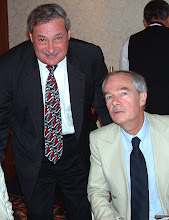
Here's the pitch...
My book is a collection of mini-biographies, travelogues and adventure tales that are interwoven through the perspective of one person’s life events. Since suffering a stroke in 1997, I have had limited time to be with my growing children, especially my youngest son, Hunter, who was born less than ten months after my stroke. So I started writing a series of letters to Hunter when he was six years old. Subsequently, these letters have taken on a life of their own. Hence, this book...
They begin with my accident, at age 19, when I was hit by a drunk driver while training for the 1968 Boston Marathon. After two years in the hospital, and seven years with braces on my legs, I worked my way up from patient to hospital CEO. I was eventually recognized as one of the top 25 turnaround hospital administrators in the U.S.
A stroke at age 48 changed my life again, bringing me back to college and to a volunteer stint as head of the United States Chess Federation. My doctor thought the position would represent semi-retirement, whereas it was intensely stressful and nearly caused my demise. With the help of friends, I gradually rearranged my priorities and found time to reflect on the issues and events found in the letters to my son. No doubt they will serve as a revelation to some and inspiration to others.
Here's the Plot outline...
On the Friday before Christmas in 1967, a drunken driver smashed into a 19-year-old college student, crushing his Olympic dreams, and leaving him in a jumble of broken bones on the side of the road. Two years and 18 operations later, the young man rode his wheelchair back to college where he pursued a new dream: becoming a hospital administrator. Motivated by a desire to make the health care system better, he earned the credentials necessary to achieve that dream. At age 40, he was recognized as on of the “Top 25 turnaround hospital CEO’s in America” by Healthweek Magazine.
Meanwhile, he assuaged his competitive instincts by playing chess, eventually devolving into the “Black and White Jungle”, a world dominated by out-of-control egos and petty, yet intense, politics. If you have heard of Bobby Fischer, Deep Blue or the theatrical production, Chess, then you have seen the tip of the iceberg of an intriguing subculture.
Throughout his journey, he was introduced to fascinating people, some famous and some unknown, who impacted his life in a profound way. He traveled all over the United States and far away places such as India and Argentina.
In 1997, he fell victim to what is known as “Economy Class Syndrome” (ECS), when a blood clot formed in his left leg during a long airplane flight and found its way to his brain causing a debilitating stroke. Once again on the sidelines, he returned to college to study the relationship between the game of chess and childhood development, and the relationship of mental exercise to Alzheimer’s disease. His discoveries in these three areas: ECS, Chess for kids and Alzheimer’s could be made, by themselves, into a worthwhile book.
One of the people he met along the way was a young radio personality in Boston by the name of Delilah. In the process of developing a life-long friendship, he helped her form a non-profit foundation called “PointHope”, a voice for forgotten children.
After suffering another physical setback in 2003, he began writing a series of letters to his six-year-old son. They were stories a father might tell his children about family, friends, issues, situations and places (together with life’s important lessons). The stories were intended to be of interest and value to the author’s children as they grow older, whether or not he will be present to answer their probing questions. In all honesty, they were not written (at least not the early chapters) with the intention of becoming a book.
Yet, with the initial encouragement of his son’s mother who was touched in a significant way (her words) when reading these stories to him, followed by the continuing motivation of Delilah (now syndicated on nearly 300 radio stations with 9 million listeners) and the gentle prodding of the author’s new wife, Natasha (Delilah’s best friend since 4th grade), it is time for these stories to be told.
Perhaps, others will find these stories worthwhile or, at least, entertaining. If neither of these, then maybe they will provide some illumination concerning the human condition (and an occasional good laugh, I promise). For those willing to come along for the journey, surprises lie ahead!
More details to come. Please come back later. And thanks for your interest.


No comments:
Post a Comment